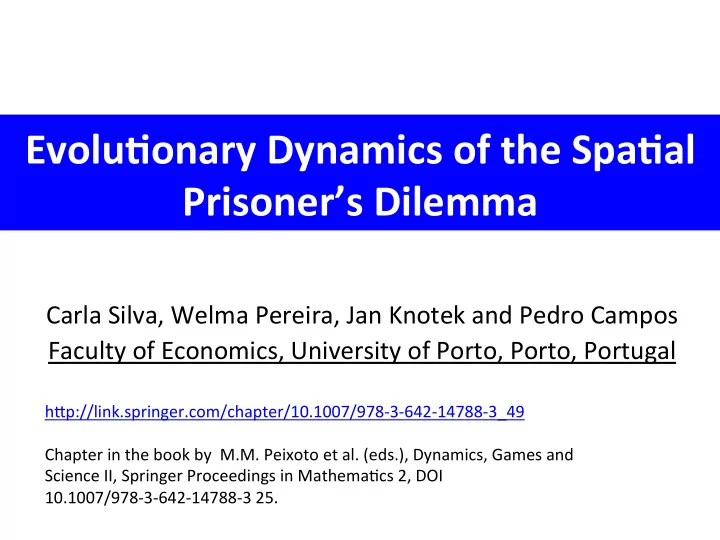

Evolu&onary ¡Dynamics ¡of ¡the ¡Spa&al ¡ Prisoner’s ¡Dilemma ¡ Carla ¡Silva, ¡Welma ¡Pereira, ¡Jan ¡Knotek ¡and ¡Pedro ¡Campos ¡ Faculty ¡of ¡Economics, ¡University ¡of ¡Porto, ¡Porto, ¡Portugal ¡ h@p://link.springer.com/chapter/10.1007/978-‑3-‑642-‑14788-‑3_49 ¡ ¡ Chapter ¡in ¡the ¡book ¡by ¡ ¡M.M. ¡Peixoto ¡et ¡al. ¡(eds.), ¡Dynamics, ¡Games ¡and ¡ Science ¡II, ¡Springer ¡Proceedings ¡in ¡MathemaWcs ¡2, ¡DOI ¡ 10.1007/978-‑3-‑642-‑14788-‑3 ¡25. ¡ ¡
Introduc&on ¡ The ¡Royal ¡Swedish ¡Academy ¡of ¡Sciences ¡has ¡decided ¡to ¡award ¡the ¡Bank ¡of ¡Sweden ¡ Prize ¡in ¡ Economic ¡Sciences ¡in ¡Memory ¡of ¡Alfred ¡Nobel, ¡2005 , ¡jointly ¡to ¡ ¡ Robert ¡J. ¡Aumann ¡ Center ¡for ¡RaWonality, ¡Hebrew ¡University ¡of ¡Jerusalem, ¡Israel ¡and ¡ Thomas ¡C. ¡Schelling ¡ Department ¡of ¡Economics ¡and ¡School ¡of ¡Public ¡Policy, ¡University ¡of ¡Maryland, ¡ College ¡Park, ¡MD, ¡USA, ¡ "for ¡having ¡enhanced ¡our ¡understanding ¡of ¡conflict ¡and ¡ coopera&on ¡through ¡game-‑theory ¡analysis". ¡ h@p://www.nobelprize.org/nobel_prizes/economic-‑sciences/laureates/2005/ press.html ¡ ¡ Alexander ¡Pope: ¡ “ a ¡li%le ¡learning ¡is ¡a ¡valuable ¡thing ¡and ¡it ¡is ¡too ¡much ¡learning ¡ that ¡is ¡dangerous ”. ¡ ¡ Source: ¡ ¡ Kraines, ¡D., ¡Kraines, ¡V.: ¡The ¡threshold ¡of ¡coopera7on ¡among ¡adap7ve ¡agents: ¡Pavlov ¡and ¡the ¡stag ¡hunt. ¡ In: ¡ECAI ¡’96: ¡Proceedings ¡of ¡the ¡Workshop ¡on ¡Intelligent ¡Agents ¡III, ¡Agent ¡Theories, ¡Architectures, ¡and ¡ Languages, ¡pp. ¡219–231, ¡London, ¡UK. ¡Springer, ¡Berlin ¡(1997 ) ¡
Vincent ¡van ¡Gogh, ¡ The ¡Round ¡of ¡the ¡ Prisoners , ¡1890, ¡ Pushkin ¡Museum, ¡ Moscow ¡
Mathema&cs, ¡Physics ¡and ¡Economics ¡ ¡ ¡ ¡ MathemaWcs: ¡ ¡ • John ¡von ¡Neumann ¡and ¡Oscar ¡Morgenstern, ¡Theory ¡of ¡Games ¡and ¡ Economic ¡Behavior, ¡Princeton ¡University ¡Press, ¡1944. ¡ • Fudenberg ¡D. ¡The ¡Theory ¡of ¡Learning ¡in ¡Games. ¡Cambridge, ¡MA: ¡MIT ¡ Press; ¡1998. ¡ • J. ¡Watson, ¡Strategy: ¡An ¡Introduc7on ¡to ¡Game ¡Theory , ¡third ¡ediWon, ¡New ¡ York: ¡W. ¡W. ¡Norton ¡and ¡Company, ¡2013. ¡ ¡ ¡ ¡ Physics: ¡ ¡ ¡ Is ¡economics ¡the ¡next ¡physical ¡science? ¡ ¡ Doyne ¡Farmer, ¡MarWn ¡Shubik ¡and ¡Eric ¡Smith, ¡Physics ¡Today, ¡2005. ¡ ¡ ¡ Evolu&onary ¡Games ¡on ¡Graphs , ¡ Gyorgy ¡Szabo, ¡Gabor ¡Fath, ¡Physics ¡Reports ¡(2007) ¡ ¡ ¡ ¡
Game ¡theory ¡for ¡applica&ons ¡ Economics: ¡ ¡ Politics: Repeated ¡games ¡ Dynamics of prisoner’s dilemma #2 #1 ¡ Physics: ¡ ¡ Biology: ¡ ¡ quantum ¡game ¡theory ¡ evoluWonary ¡game ¡theory ¡ #3 ¡ #4 ¡ • #1. ¡Repeated ¡games ¡where ¡the ¡payoffs ¡and ¡monitoring ¡structure ¡are ¡unknown, ¡D. ¡Fudenberg ¡ and ¡Y. ¡Yamamoto, ¡Econometrica, ¡Vol. ¡78, ¡No. ¡5 ¡(September, ¡2010), ¡1673–1710. ¡ • #2. ¡Robert ¡Axelrod, ¡"The ¡Evolu7on ¡of ¡Strategies ¡in ¡the ¡Iterated ¡Prisoner's ¡Dilemma," ¡1987. ¡ ¡ • #3. ¡Quantum ¡Stackelberg ¡duopoly ¡with ¡incomplete ¡informa7on, ¡C.-‑F. ¡Lo, ¡D. ¡Kiang, ¡Physics ¡ Leders ¡A ¡346 ¡(2005) ¡65–70. ¡ ¡ • #4. ¡Emergence ¡of ¡coopera7on ¡and ¡evolu7onary ¡stability ¡in ¡finite ¡popula7ons , ¡ M. ¡A. ¡Nowak, ¡A. ¡ Sasaki, ¡C. ¡Taylor ¡& ¡D. ¡Fudenberg, ¡Nature, ¡vol.428, ¡2004. ¡ ¡
What ¡is ¡a ¡Game? ¡
Why ¡Do ¡Economists ¡Study ¡Games? ¡
Represen&ng ¡games ¡
Investment ¡game ¡ • Players ¡choose ¡acWons ¡in ¡a ¡parWcular ¡sequence ¡are ¡sequenWal ¡move ¡games. ¡ ¡ • Player ¡is ¡either ¡the ¡sender ¡or ¡the ¡receiver. ¡ ¡ • If ¡player ¡is ¡the ¡receiver, ¡wait ¡for ¡the ¡sender's ¡decision. ¡
Nash ¡equilibrium ¡ A ¡situa&on ¡in ¡which ¡neither ¡of ¡the ¡players ¡can ¡improve ¡his ¡ payoff ¡by ¡a ¡unilateral ¡change ¡of ¡strategy ¡is ¡a ¡Nash ¡equilibrium. ¡ ¡ John ¡F. ¡Nash, ¡Equilibrium ¡Points ¡in ¡n-‑Person ¡Games, ¡PNAS, ¡36 ¡ (1950) ¡48-‑49. ¡ ¡ Once ¡a ¡Nash ¡equilibrium ¡has ¡been ¡reached ¡no ¡player ¡has ¡a ¡reason ¡ to ¡deviate ¡from ¡his ¡strategy-‑ ¡even ¡if ¡another ¡state ¡would ¡provide ¡ a ¡higher ¡payoff ¡for ¡both ¡players. ¡ ¡ A ¡strategy ¡profile ¡ is ¡called ¡a ¡ subgame ¡perfect ¡Nash ¡equilibrium ¡ if ¡ it ¡specifies ¡a ¡Nash ¡equilibrium ¡in ¡every ¡ subgame ¡of ¡the ¡original ¡ game. ¡
Monopoly ¡manufacturer/monopoly ¡retailer ¡ Joel ¡Watson, ¡Strategy: ¡An ¡Introduc7on ¡to ¡Game ¡Theory , ¡New ¡York: ¡W. ¡W. ¡Norton ¡ and ¡Company, ¡2007. ¡
Cournot ¡Duopoly ¡ Joel ¡Watson, ¡Strategy: ¡An ¡ Introduc7on ¡to ¡Game ¡ Theory , ¡New ¡York: ¡W. ¡W. ¡ Norton ¡and ¡Company, ¡2007. ¡
Repeated ¡Cournot ¡duopoly ¡ In ¡a ¡repeated ¡game, ¡players ¡ interact ¡by ¡playing ¡a ¡stage ¡ game ¡in ¡each ¡of ¡a ¡number ¡of ¡ periods. ¡ ¡ ¡ Their ¡payoffs ¡for ¡the ¡repeated ¡ game ¡are ¡the ¡sum ¡of ¡stage-‑ game ¡payoffs ¡in ¡the ¡individual ¡ periods ¡(someWmes ¡ discounted). ¡ Joel ¡Watson, ¡Strategy: ¡An ¡Introduc7on ¡to ¡Game ¡Theory , ¡New ¡York: ¡W. ¡W. ¡ Norton ¡and ¡Company, ¡2007. ¡
Empirical ¡game ¡theory ¡ Building ¡models ¡of ¡games ¡using ¡simula&on ¡or ¡other ¡empirical ¡evidence. ¡ Trading ¡Agent ¡Compe&&on ¡ ¡ Supply ¡Chain ¡Management ¡game . ¡ ¡ h@p://www.powertac.org ¡ ¡ h@p://tradingagents.org/ ¡ ¡ h@p://tac.sics.se/page.php?id=1 ¡ ¡ Robust ¡Bayesian ¡Methods ¡for ¡ Stackelberg ¡Security ¡Games, ¡ C ¡Kiekintveld, ¡J ¡Marecki, ¡M ¡ Tambe, ¡ Ninth ¡Interna7onal ¡ Conference ¡on ¡Autonomous ¡ Agents ¡and ¡Mul7agent ¡Systems, ¡ AAMAS ¡2010. ¡ ¡
Designing ¡games ¡to ¡conduct ¡experiments ¡online ¡ h@p://www.comlabgames.com ¡
The ¡Prisoners' ¡Dilemma ¡Game ¡ Introduced ¡by ¡Albert ¡W. ¡Tucker ¡Princeton ¡University: ¡ Tucker, ¡A.W., ¡Kuhn, ¡H.W.: ¡Contribu7ons ¡to ¡the ¡Theory ¡of ¡Games ¡I. ¡Annals ¡of ¡Mathema7cs ¡ Studies, ¡no. ¡24. ¡Princeton ¡University ¡Press, ¡Princeton ¡(1950) ¡ ¡
The ¡Prisoners' ¡Dilemma ¡visualiza&on ¡ Prisoners' ¡Dilemma ¡is ¡an ¡example ¡of ¡a ¡Non-‑Zero ¡Sum ¡Game, ¡players ¡interests ¡are ¡not ¡ always ¡in ¡direct ¡conflict, ¡so ¡that ¡there ¡are ¡opportuniWes ¡for ¡both ¡to ¡gain. ¡For ¡example, ¡ when ¡both ¡players ¡choose ¡Don’t ¡Confess ¡in ¡the ¡Prisoners' ¡Dilemma. ¡ ¡ ¡ The ¡Nash ¡equilibrium ¡for ¡Prisoner’s ¡dilemma ¡(1: ¡defect/2:defect). ¡
The ¡Prisoners' ¡Dilemma ¡ Gain ¡of ¡the ¡resource ¡v, ¡ Cost ¡of ¡injury ¡c, ¡ Assump&on ¡is ¡that ¡v>c ¡
Recommend
More recommend